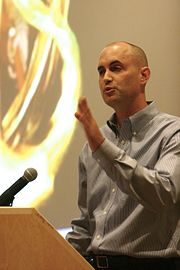
B. J. Fogg
Encyclopedia

Captology
Captology is the study of computers as persuasive technologies. This area of inquiry explores the overlapping space between persuasion in general and computing technology...
," a word he coined to describe the overlap between persuasion
Persuasion
Persuasion is a form of social influence. It is the process of guiding or bringing oneself or another toward the adoption of an idea, attitude, or action by rational and symbolic means.- Methods :...
and computers.
Fogg was named in article on Fortune Magazine "10 new gurus you should know."
As a doctoral student at Stanford University
Stanford University
The Leland Stanford Junior University, commonly referred to as Stanford University or Stanford, is a private research university on an campus located near Palo Alto, California. It is situated in the northwestern Santa Clara Valley on the San Francisco Peninsula, approximately northwest of San...
(1993-1997), Fogg used methods from experimental psychology
Experimental psychology
Experimental psychology is a methodological approach, rather than a subject, and encompasses varied fields within psychology. Experimental psychologists have traditionally conducted research, published articles, and taught classes on neuroscience, developmental psychology, sensation, perception,...
to demonstrate that computers can change people's thoughts and behaviors in predictable ways. His thesis was entitled "Charismatic Computers."
Fogg founded the Stanford Persuasive Technology Lab. The Lab received a grant from the National Science Foundation
National Science Foundation
The National Science Foundation is a United States government agency that supports fundamental research and education in all the non-medical fields of science and engineering. Its medical counterpart is the National Institutes of Health...
in 2005 to support experimental work investigating how mobile phones can motivate and persuade people, an area the lab calls "mobile persuasion."
In 2003 Fogg published the book "Persuasive Technology: Using Computers to Change What We Think and Do." This book lays the foundation for captology.
In 2007, Fogg created a Stanford course about Facebook Apps. Using what Fogg calls "Mass Interpersonal Persuasion," his students engaged over 16 million people in 10 weeks http://www.businessweek.com/innovate/content/apr2008/id2008042_809134.htm with projects done for the class.
He is the founder and director of Stanford's annual Mobile Health conference.
Fogg has created a new model of human behavior change. In 2011, the World Economic Forum selected the Fogg Behavior Model as their framework for health behavior change.
Fogg is the brother of Linda Fogg Phillips, an author and speaker on the issues of social media and parenting.

